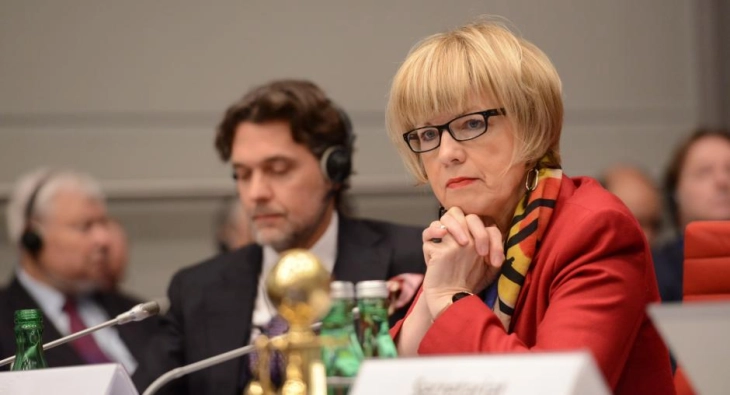Helga Maria Schmid: Strengthening the Rule of Law: Combating Corruption for a More Just Society
- What does it take to get a doctor’s appointment these days? Or an apartment, a job, a driver’s license? These tasks can be a hassle even in the best of circumstances, but for many, there are additional barriers that pose serious, sometimes life-threatening challenges. Corruption also fuels organized crime and is a real obstacle to government efforts to ensure safety, stability, and prosperity for their people.
- Post By Nevenka Nikolik
- 15:25, 16 June, 2023

16 June 2023
What does it take to get a doctor’s appointment these days? Or an apartment, a job, a driver’s license? These tasks can be a hassle even in the best of circumstances, but for many, there are additional barriers that pose serious, sometimes life-threatening challenges. Corruption also fuels organized crime and is a real obstacle to government efforts to ensure safety, stability, and prosperity for their people.
This is not a minor problem. In their most recent Global Corruption Barometer, Transparency International found that ¼ of all those interviewed said they had to pay a bribe within the last year. And for all that might be willing to disclose their experience, we know that many more might not be willing or able to report the corruption they encounter. Corruption is a problem everywhere, and the consequences are far-reaching – with effects on individuals, families, communities, countries, and entire regions. Combating corruption is vital not only to support the freedom and security of individuals but the resilience of societies and the systems on which they rely.
As the world’s largest security organization, the OSCE engages with 57 participating States across Europe, Eurasia, and North America, pursuing a comprehensive approach to security and combatting corruption is an important part of our work. We work with countries and civil society alike to achieve a balance of rights and privileges, and ensure genuine equality for all. At the heart of these efforts is the urgent need to strengthen the rule of law, as the foundation for participatory democracy and good governance.
I am currently participating in the Prespa Forum Dialogue – a conference hosted by North Macedonia that brings together leaders from across the region and around the world to discuss challenges in the Western Balkans and how best to address them. And here the OSCE has a vital role to play. With offices throughout the region – not only in capitals but also in smaller communities, we are directly engaging to support efforts to address corruption and strengthen the rule of law.
By working closely with national authorities and state institutions, the OSCE actively promotes resilient societies.
North Macedonia – the Chair of the OSCE for 2023 – is leading by example with its commitment to fighting corruption. The OSCE Mission to Skopje has been actively involved in a number of important initiatives to strengthen anti-corruption efforts. In March, the OSCE Mission and the State Commission for Prevention of Corruption outlined their joint commitment to identifying and addressing corruption risks head-on, advocating evidence-based anti-corruption policies, and strengthening the integrity systems of the country.
As a result, we published a Corruption Risk Assessment of the Judiciary earlier this week. This joint effort between the State Commission for Prevention of Corruption, the Association of Judges, and the Association of Public Prosecutors in the Republic of North Macedonia provides a roadmap for future policy-making and the design of more effective anti-corruption strategies – tools that will be key to achieving progress in this fight.
One of the areas we are particularly focused on is the reality that corruption is not gender neutral. Research consistently shows that female public officials are significantly less likely to engage in corrupt practices than their male counterparts. And, when it comes to those who are negatively affected by corruption, women bear a disproportionate burden, both personally and economically.
When it comes to women in politics, North Macedonia has a good story to tell; 42 per cent of its parliamentarians are women, an outstanding leap compared to four per cent in 1994. And on the negative impacts on women, the OSCE Mission to Skopje and the Government of North Macedonia have taken on the problem of "sextortion", particularly as it relates to public institutions. This abhorrent practice involves the extortion of sexual favours in exchange for services from public institutions and we’re working together to ensure implementation of the Criminal Code. On another positive note, the Mission to Skopje and the Ministry of Justice have worked hard to ensure greater protection for gender-based violence and sexual violence victims including with the latest amendments to the Criminal Code this year, which were developed through the Mission’s extensive support to the legislation drafting process. These are important examples of our joint commitment to gender equality and justice.
In North Macedonia, across Southeastern Europe, and well beyond, the OSCE provides critical support to governments working to strengthen the rule of law, combat corruption, and improve gender equality. This is essential, given how corrosive corruption can be – undermining trust in governments and institutions, and tearing at the fabric of our societies. We have shown that it is possible to tackle corruption by working together. It is not an easy task, but we have the tools we need to foster trust, revitalize our institutions, and build a future where corruption is no longer an obstacle to security and prosperity for all.
Helga Maria Schmid
OSCE Secretary General
Photo: OSCE







